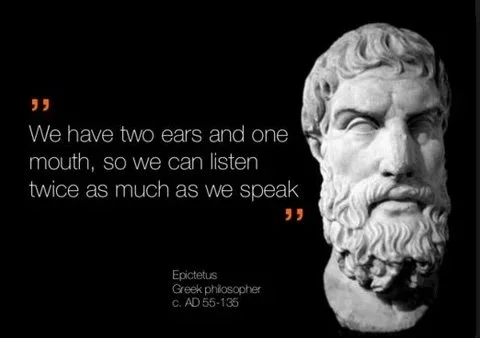The leadership habit that’s killing innovation
Let’s start with a confession: I have strong opinions. And, unsurprisingly, I’m not shy about sharing them.
On the upside, this means people rarely have to guess where I stand on an issue. I value clarity, and I don’t want anyone reading between the lines.
But here’s the downside: speaking up first—and often—can unintentionally silence other voices in the room. It’s a lesson I’ve had to learn the hard way.
I wanted to share this journey with you, not because I’ve mastered it, but because I think it’s a challenge many of us face as leaders—or even just as humans.
We’ve all heard the saying:
It’s one of those quotes that’s funny to hear but putting it into practice? That’s a whole different ballgame.
This was especially hard for me when I first stepped into a leadership role. I quickly realized that when I spoke first, the room fell silent. People listened—but they didn’t speak.
But when I chose to listen first and save my thoughts for last, everything changed. The room came alive with perspectives and ideas that I never would have heard otherwise.
The real turning point came during an offsite with The Table Group last year. Before the session, they sent me a “precap” with this guidance:
“We’ll call on you to go first in vulnerability but last in giving your opinions. Your role is to invite debate—leaning into curiosity, not advocacy—and ultimately drive clarity and closure. Expect commitment, not consensus.”
That advice hit me like a ton of bricks. SUCH a fascinating challenge:
First in vulnerability, last in opinions.
Curiosity, not advocacy.
Commitment not consensus.
It’s the opposite of how most of us are taught to lead.
The media often portrayed Steve Jobs as a steamroller leader who just forced everyone into his way of thinking. But in his iconic D8 conference interview, a different picture emerges:
Mossberg: And are people willing to tell you you’re wrong?
Jobs: (laughs) Yeah.
Mossberg: I mean, other than snarky journalists, I mean people that work for you?
Jobs: Oh, yeah, no we have wonderful arguments.
Mossberg: And do you win them all?
Jobs: Oh no I wish I did. If you want to hire great people and have them stay working for you, you have to let them make a lot of decisions and you have to, you have to be run by ideas, not hierarchy. The best ideas have to win, otherwise good people don’t stay.
Mossberg: But you must be more than a facilitator who runs meetings. You obviously contribute your own ideas.
Jobs: I contribute ideas, sure. Why would I be there if I didn’t?
That’s not the Steve Jobs we heard about in the documentaries and tv shows is it
The point is, as much as I might like to think I have good ideas, chances are, the quieter voices in the room have great ones.
Randy Wootton, CEO of Maxio, and I discuss this concept in our recent conversation on The LeadrPulse Podcast. Tune in to hear his expertise on how to pull innovation from your team by being the last to speak. (We also cover the power of healthy conflict, relationship-driven vs. performance-driven leadership, and the secret to career advancement.) Don't miss it.
As leaders (and we’re all a leader even if we aren’t THE leader), it’s our job to draw out those ideas—to create space for others to share.
It’s a discipline I’m still working on. Fighting the impulse to jump in first is tough. But every day, I’m learning to pause, to listen, and to let others lead.
How about you?
PS. If you’re the kind of person who defers too often, letting others take the lead even when you have something valuable to share, here’s a challenge for you:
Ask yourself if you’re speaking up enough. Are you sharing your insights?
Leadership isn’t just about making room for others—it’s about finding the right balance.
Let’s figure it out together.
Lead on,
MT
PS. The LeadrPulse Podcast is your source for actionable insights for leaders revolutionizing the world of work. My cohost, Leadr CMO Holly Tate, and I drop weekly episodes breaking down the hottest topics and toughest challenges facing leaders today with some of the top industry experts you know and aspire to learn from.

